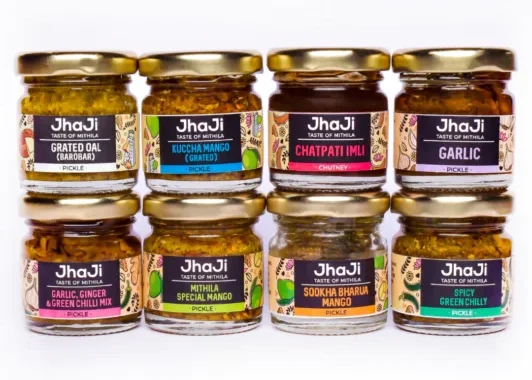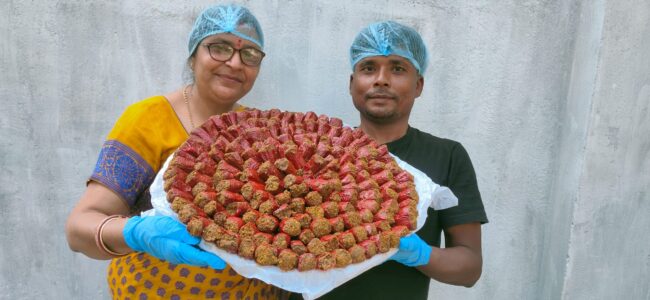How Bihar-based D2C pickle brand JhaJi went from a single order to 80,000 orders in just 2 years
New Delhi: Bihar-based D2C pickle brand JhaJi has clocked over 80,000 orders in just two years since its inception in June 2021, while the pandemic was still around. The brand expects to clock more than Rs 10 crore by the end of 2023 and has already sold pickles worth Rs 2 crore in the first three months of the year itself.
Founded by two Darbhanga, Bihar-based women Kalpana Jha and Uma Jha, former a homemaker and the latter a school teacher, the brand was launched with the sole purpose of making Bihar’s cuisine known to the world. The Sisters-in-law duo started the brand with an initial funding of Rs 10 lakh, which they received from Kalpana Jha’s spouse Manoj Kumar Jha, who is a retired IAS officer and currently oversees administration at JhaJi.

Initially, they started their pickle business at the backyard of their house, until March of this year when they relocated the production to their recently acquired kitchen factory at Taralahi, Darbhanga. The duo makes pickles using traditional recipes from Mithilanchal, a region in North-East Bihar. These are traditional sun-dried pickles made without using chemicals, preservatives, or colours in products.
“We want to take Mithilanchal’s flavours from Darbhanga to the world,” Kalpana Jha said sharing her vision behind JhaJi, which today has over 60,000 customers. When asked the reason behind the brand’s name, Kalpana Jha said, “JhaJi name is unique to the region of Mithilanchal and also its the family surname which also suggests this is a homely brand – the pickles are coming from the house of JhaJi.”
With the brand’s short and catchy name, the Bihar-based women entrepreneurs aim to create a brand image that would evoke friendly emotion.
The brand first came to the limelight due to the reality TV show Shark Tank India, where the founders asked the judges for Rs 50 lakh funding for 10% equity in season 1 episode 4. Unfortunately, they were rejected. Not taking no for an answer, the founders tried their luck once again in the next season of Shark Tank India. This time, fate favoured them and they secured a funding of Rs 85 lakh for 8.45% equity from some of the well-known women entrepreneurs including Namita Thapar (executive director at Emcure Pharmaceuticals), Vineeta Singh (founder of Sugar cosmetics), and Jharkhand Angels.
Today, the duo doesn’t just sell pickles but also provides job opportunities to local women—51 of their current 65 employees are women.
In an exclusive interview with IndiaRetailing Kalpana Jha tells us about their story, strategy, and plans.
It has been almost two years since JhaJi was launched, how has the journey been so far?
It has been humbling, to say it in a single word. We have received over 80,000 orders during this period, from almost every part of the country.
I’m also amazed by the exceptional work ethic of my team. Most of my teammates are homemakers turned pickle-makers, who have become self-reliant perhaps for the first time in their lives.
I’m thankful that through our pickles business, we are able to make a small yet significant difference in the lives of our people in Darbhanga. This is the highlight of our journey.
Are you planning to launch new products this year?
In the second half of 2023, we’ll begin operations to expand into new food categories like mithila makhana, flattened rice from Bhagalpur, and famous Bihari dry sweets and namkeens like khaja, thekua, anarsa, pirikiya and kala jamun.
Which is your bestselling product?
Our signature, best-selling, and highest-rated product is Mithila special mango pickle. It was also recognised as the best pickle of 2022 by Mishry Reviews.
(Mishry.com is a Gurugram-based product review website that gives in-depth reviews of kitchen appliances, cooking tools, ingredients, staples, etc.)
Where can we find your products?
You can order from our website, www.jhajistore.com. We ship our orders from our warehouses in Patna, Bengaluru and Gurugram, and most orders are delivered within 3-7 days across India.

This is a crowded category with many established and emerging brands. How do you plan to stay ahead of them?
At JhaJi Store, our ambition is to become a household brand for Bihari food and cuisine. Pickles and chutneys are a starting point for our business, as both Uma and I have made pickles all our lives, and it felt like the right category to begin with.
To spread the word about JhaJi Store, we make stories around aspects such as Bihar’s culture, cuisine, food, customs, clothing, lifestyle, and, of course, the pickle-making process. We create content and share it among the audiences on social media, primarily to get them excited about trying our pickles and chutneys.
How has the consumer response been so far?
We have served over 80,000 orders in about 20 months so far.
Every week, we take feedback from 20% of our customers who placed an order. The feedback is collected over calls, WhatsApp, and emails and nine out of every 10 customers say our pickles meet or exceed their expectations.
This is in line with our initial goal to make sure 90% of our customers like the taste of our products.
What are your expansion plans for 2023?
JhaJi Store aspires to be a single brand for everything related to Bihari cuisine, while also creating meaningful livelihood opportunities for over 300 women in the Darbhanga region.
Currently, 90% of our orders come from our own website jhajistore.com. Now, we’re also available on Amazon and Big Basket.
Do you plan on going international?
Absolutely, we want to take Mithilanchal’s flavours #DarbhangaSeDuniyaTak (From Darbhanga to the world).
In 2023, our focus is on making our products more accessible to customers beyond the metro cities. In late 2023 or early 2024, we plan to begin making the necessary efforts to send these pickles to customers who’re eager to receive them across the US, Middle East, Europe, Australia, and South Asia. This includes getting the necessary food certifications.
How do you plan on using the funding received from Shark Tank?
We’ve raised Rs 1.2 crore, with investments from Sharks Vineeta and Namita and investors of Jharkhand Angels Network (JAN).
The funds will primarily be invested across working capital for inventory (50%), capacity expansion (30%), and marketing (20%).
Our new manufacturing facility in Taralahi, Darbhanga was inaugurated in March this year. The new kitchen factory will start with 50 employees. It can have up to 200 people making pickles and chutneys.
Are you looking to get more funding?
We’re planning to get funding of Rs 10 – 15 crore later this year to meet revenue targets, build a senior management team, expand manufacturing capacity, launch offline retail partnerships and prepare the company to ship the pickles internationally in 2024.
Who are your key investors?
Vineeta Singh, founder, Sugar – a D2C cosmetics brand; Namita Thapar, executive director, Emcure Pharmaceuticals; Sujay Mishra, director, R B Memorial Hospital in Darbhanga and Sachin Shetty, co-founder, GIVA – a D2C jewellery brand.
How much is the brand’s yearly turnover?
The brand is set to complete the financial year 2022-23 at over Rs 4 crore in revenues, a five times increase from the financial year 2021-22 revenues of Rs 80 lakh.
We expect to do more than Rs 10 crore in the calendar year 2023 and have already sold pickles worth Rs 2 crore in the first three months.


